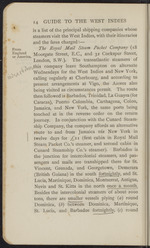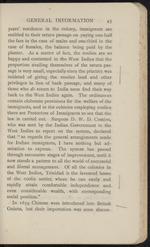| 1 |
 |
“...is Barbados, Trinidad, La Guayra (for
Caracas), Puerto Colombia, Carthagena, Colon,
Jamaica, and New York, the same ports being
touched at in the reverse order on the return
journey. In conjunction with the Cunard Steam-
ship Company, the company affords an alternative
, route to and from Jamaica via New York in
twelve days for ^11 (first cabin in Royal Mail
Steam Packet Co.’s steamer, and second cabin in
Cunard Steamship Co.’s steamer). Barbados is
the junction for intercolonial steamers, and pas-
sengers and mails are transhipped there for St.
Vincent, Grenada, and Georgetown, Demerara
(British Guiana) in the south fortnightly, and St.
Lucia, Martinique, Dominica, Montserrat, Antigua,
Nevis and St. Kitts in the north once a month.
Besides the intercolonial steamers of about 2000
tons, there are smaller vessels plying (a) round
Dominica, (b) between Dominica, Martinique,
St. Lucia, and- Barbados fortnightly, (c) round...”
|
|
| 2 |
 |
“...GENERAL INFORMATION
45
years’ residence in the colony, immigrants are
entitled to their return passage on paying one-half
the fare in the case of males and one-third in the
case of females, the balance being paid by the
planter. As a matter of fact, the coolies are so
happy and contented in the West Indies that the
proportion availing themselves of the return pas-
sage is very small, especially since the practice was
initiated of giving the coolies land and other
privileges in lieu of back passage, and many of
those who do return to India soon find their way
back to the West Indies again. The ordinances
contain elaborate provisions for the welfare of the
immigrants, and in the colonies employing coolies
there are Protectors of Immigrants to see that the
law is carried out. Surgeon D. W. D. Comins,
who was sent by the Indian Government to the
West Indies to report on the system, declared
that “ as regards the general arrangements made
for Indian immigrants, I have nothing but ad-
miration...”
|
|
